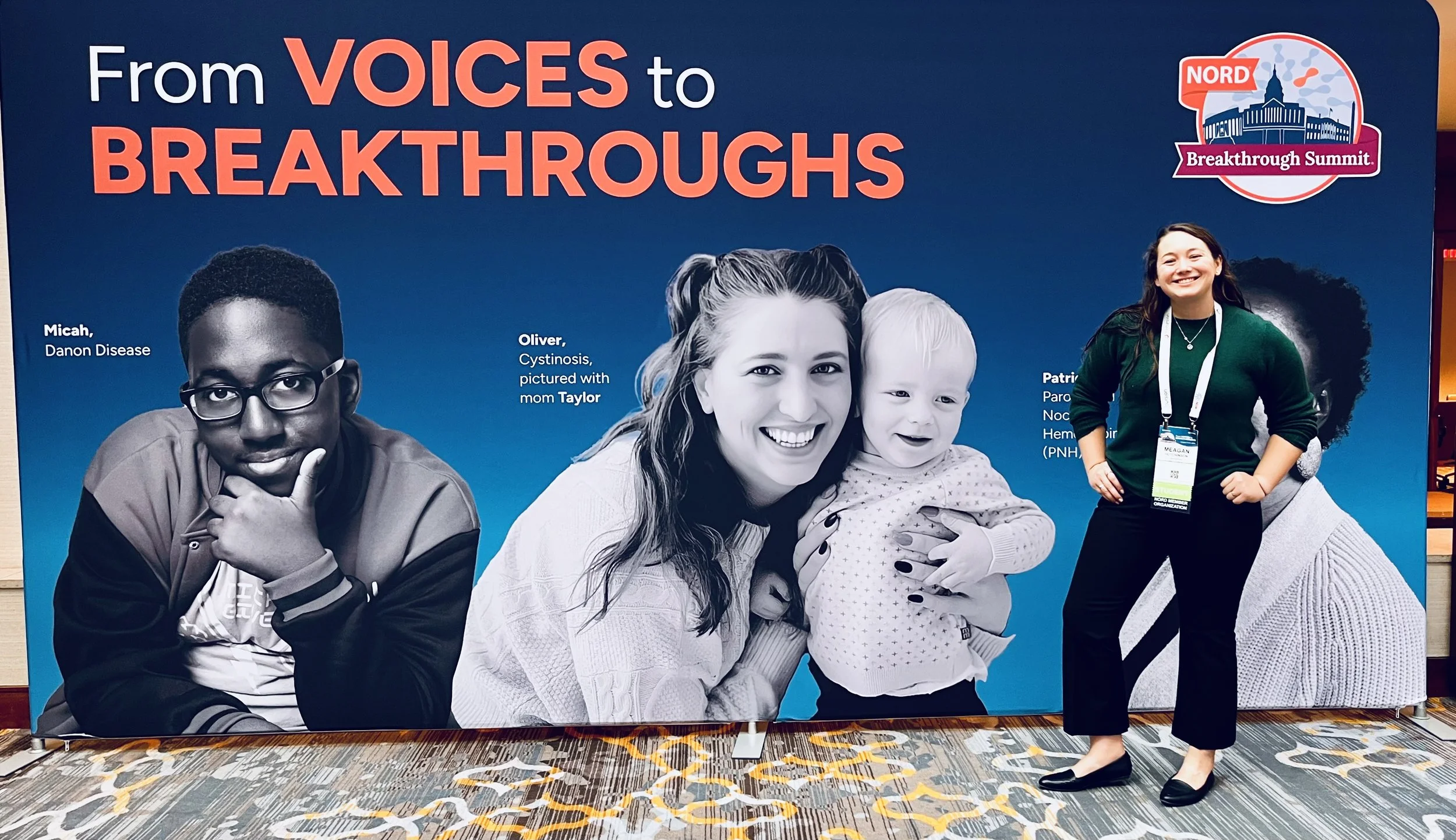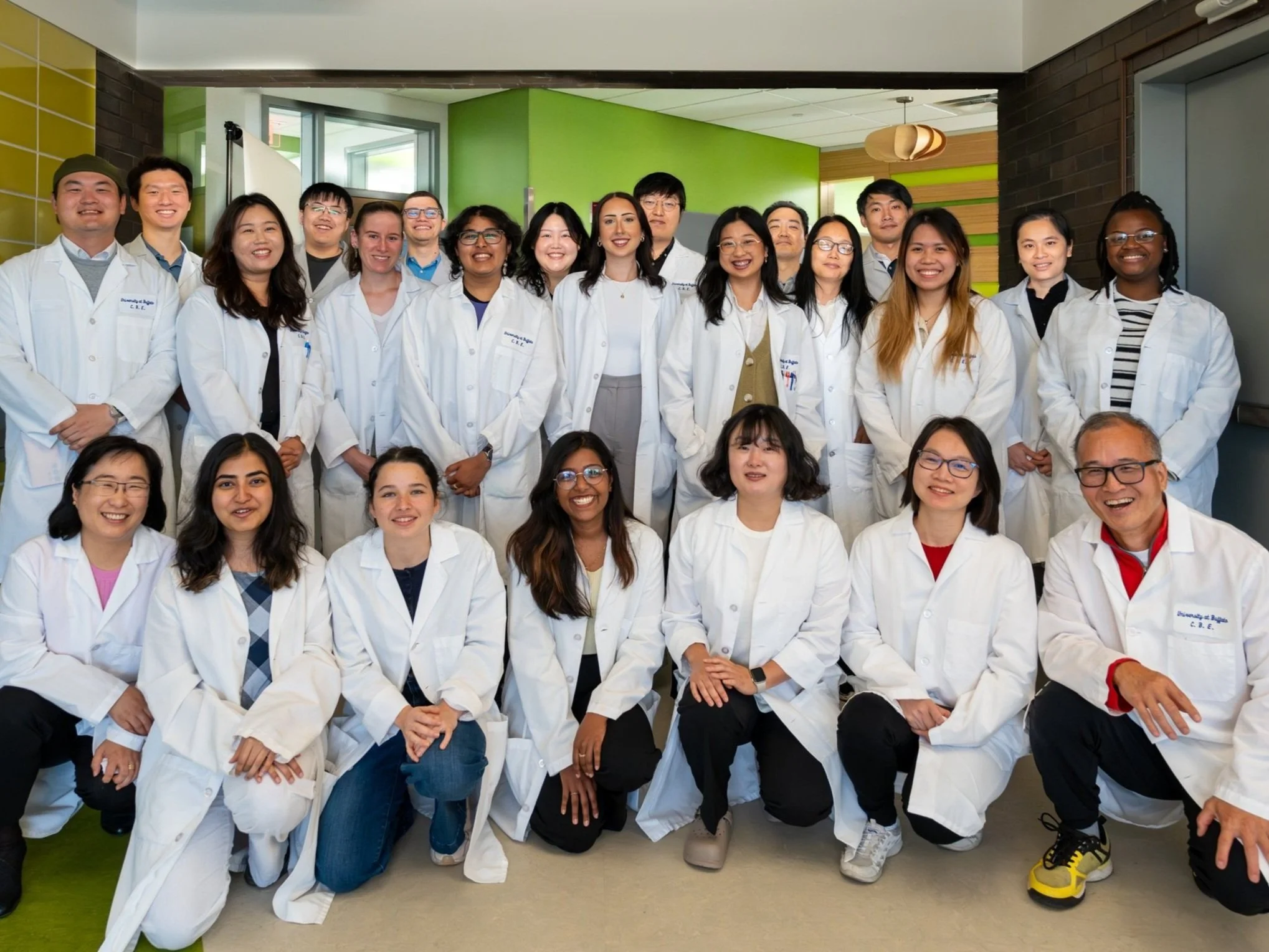Meet Meagan Hutchinson MD-PhD Candidate Bridging Clinical Care and FOXG1 Research
Meagan hiking in Arizona with her dog Cortana
From the moment you meet Meagan Hutchinson, it’s clear that she is more than a scientist: she’s an advocate. Her warmth, empathy, and unwavering commitment to helping patients shine through in everything she does. As an MD-PhD candidate in the Neuroscience program at the University at Buffalo, Meagan is building a career dedicated to improving the lives of individuals and families affected by rare diseases.
At the FOXG1 Research Center, Meagan plays a vital role in connecting the lab’s groundbreaking research with the families who make it possible. She helps bridge the gap between data and human experience - translating clinical information into meaningful insights that move research forward.
Whether she’s working on new studies, analyzing patient data, or talking directly with families, Meagan approaches every part of her work with compassion and purpose.
She’s also the person families can turn to when they want to learn more about participating in research. Meagan is always willing to answer questions, share updates, and help connect interested families with the right studies. Her dedication to collaboration and communication makes her an invaluable link between the science being done in the lab and the people it’s designed to help.
The FOXG1 community is fortunate to have her guiding this essential bridge between research and patient care - a role that perfectly captures her belief that science is most powerful when it serves people!
A Path Shaped by Curiosity and Care
Meagan grew up in Virginia and has always been fascinated by how the brain works. After undergoing spinal surgery at age 12, she developed a lasting curiosity about the central nervous system and the body’s ability to heal. That early experience set her on a path toward science and medicine.
She went on to earn her bachelor’s degree in Biomedical Science and Psychology at the University of Lynchburg and later completed a master’s degree in Neuroscience at McGill University in Montreal. During her time at McGill, Meagan studied congenital mirror movement disorder and became deeply involved in rare disease advocacy.
It was there that a key mentorship moment changed her trajectory. Working under a neurologist who had completed MD-PhD training, Meagan watched as patients were enrolled in research studies and saw firsthand how much hope it brought them. Until that point, she hadn’t realized how directly research could touch patients’ lives. That experience opened her eyes to the powerful intersection of medicine, advocacy, and discovery. It inspired her to pursue both clinical and scientific training.
Now, as a dual-degree candidate at the University at Buffalo, Meagan combines her research skills with medical training to better understand the mechanisms behind neurodevelopmental disorders like FOXG1 syndrome. Collaboration has been a central part of her journey, and she credits the many scientists and mentors she’s worked with for shaping her approach to research.
Joining the FOXG1 Research Center
Meagan’s connection to the FOXG1 Research Center began through her advocacy work. While organizing UB’s first Rare Disease Day in 2023 - a campus-wide event that brought together over 150 attendees and multiple patient advocacy groups - she invited Dr. Jae Lee to speak. The experience sparked her interest in the lab’s mission and led her to complete a research rotation.
She was immediately inspired by the lab’s collaborative spirit and the tangible progress being made to understand and treat FOXG1 syndrome. The opportunity to combine her clinical and research interests made the Lee lab the perfect fit.
Today, Meagan plays a key role in bridging clinical and laboratory research. Her work helps connect patient data with molecular and cellular findings, creating a more complete picture of FOXG1 syndrome and laying the groundwork for future targeted therapies.
Connecting the Lab and the Clinic
Meagan’s days are filled with variety: balancing time between benchwork, data analysis, and collaboration. She works with animal models, performs molecular assays, and analyzes clinical data, all while meeting regularly with mentors and fellow researchers. This combination of hands-on science and data-driven inquiry allows her to explore how different FOXG1 variants influence brain development and function.
One of her current projects focuses on electrophysiology, studying how neurons send and receive electrical signals. These studies help reveal how specific FOXG1 variants may alter the way neurons communicate, offering insights into how the disorder affects brain activity.
Each dataset she works with represents real families, and that sense of purpose motivates her through the challenges of research.
Finding Meaning in Every Data Point
Meagan’s work is driven by gratitude for the families who participate in research and share their stories. She often emphasizes how much effort it takes for families of children with complex medical needs to contribute to registries and studies, and she sees each data point as a reflection of their trust and hope.
Her perspective is also shaped by her long-standing involvement in rare disease advocacy. With over 7,000 rare diseases identified and 95% still lacking a treatment option, she believes in the importance of giving these communities a voice. As Meagan explains, “In medical school we’re trained that if you hear hoofbeats, think horses, not zebras. Well, it turns out that there are a lot of zebras out there who need our help.”
This mindset guides her work every day - reminding her that behind every experiment are patients and families waiting for answers.
A Hopeful Future for FOXG1 Research
The FOXG1 field is moving quickly, and Meagan is encouraged by how much progress has been made toward understanding the underlying mechanisms of the syndrome. The integration of patient data, laboratory findings, and clinical insights is helping the research community move closer to personalized therapies.
She hopes to see continued collaboration across scientists, clinicians, and families, and to help transform research findings into real-world progress for the FOXG1 community.
Outside the Lab
Outside of her research, Meagan enjoys spending time outdoors - hiking, running, and kayaking are her favorite ways to recharge. She also continues to volunteer with rare disease organizations and help lead advocacy events that bring attention to the needs of patients and families.
Living in Buffalo has been a highlight of her journey so far. She appreciates the welcoming community and the balance of city and nature the region offers!
Meagan’s blend of scientific precision, compassion, and dedication to rare disease advocacy makes her an invaluable member of the FOXG1 Research Center. Her work continues to bridge the gap between science and patient care, helping turn research progress into hope for families around the world.
Meagan at the National Organization for Rare Disorders (NORD) Summit
FOXG1 Research Center is dedicated to understanding and finding treatments for FOXG1 syndrome and other neurodevelopmental disorders.
Our Team
Drs. Soo-Kyung Lee, PhD. and Jae W. Lee, PhD. are the principal investigators of FOXG1 Research Center. Our team is full of dedicated individuals with the common goal of studying FOXG1 Syndrome to find treatment options and further understand the condition.
Our Publications
To learn more details about our research, please refer to our publications.





